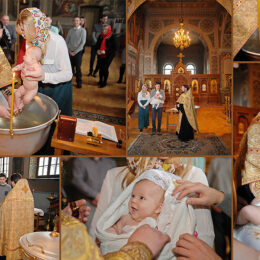BreakPoint | by Regis Nicoll | 3/12/2010
![]()
God: “He is there,” wrote the late Francis Schaeffer, “and He is not silent.”
As I have noted elsewhere, God not only is there, he has given us ample evidence of that fact through his Word: the incarnate Word of Jesus Christ, the written Word of Scripture, and the Word of creation, conscience, and the Church, with the indwelling Word of Holy Spirit as light and guide.
Misunderstood, ignored
Few doctrines of the Church are as misunderstood as that of the Holy Spirit. I suspect this is partly due to His title. The word “spirit” conjures up a fuzzy, if not, spooky image—a mysterious life-force, a formless immaterial being, a wraith—that inclines us to think of the Holy Spirit as “it” rather than “Him.”
There’s also the matter of instruction. Although we give the Holy Spirit a nod in our slogans, mission statements and church talk, He is largely ignored in our teaching, except as he relates to our spiritual gifts and prayer life.
He creates
For folks who think of the Holy Spirit only as a New Testament gift to believers, his involvement in creation and throughout the Old Testament can come as a surprise. For instance, in the opening verses of Genesis, the Holy Spirit is seen “hovering over the waters” of the unformed earth.
When God said, “Let us make man in our image,” He was referring to the triune partnership of Father, Son, and Holy Spirit. Job’s friend, Elihu, confirms the Spirit’s creative role in his counsel to Job: “The Spirit of God has made me; the breath of the Almighty gives me life.”
From Creation to the Incarnation, the Scriptures tell of the Spirit descending upon individuals who are tagged for some divine task—defeat a pagan foe, lead a rebellious nation, or speak a prophetic word. In contrast to the “indwelling” of believers in the Church Age, the Spirit’s “ondwelling” was temporary and selective.
But whether by “ondwelling” or “indwelling,” the Holy Spirit empowers humans to accomplish things that are humanly impossible, thus giving witness to the God “who is there.”
He inspires
The second letter of Peter is addressed to a church that was scattered, suffering, and swaying under the influence of heresies. To encourage the believers and help shore up their faith, Peter reminded them of the apostles’ accounts of Jesus’s life, death, and resurrection—eyewitness accounts detailing the fulfillment of Old Testament prophesies.
Peter went on to explain the Source of the prophetic accuracy: “No prophesy of Scripture came about by the prophet’s own interpretation. For prophecy never had its origin in the will of man, but men spoke from God as they were carried along by the Holy Spirit.”
Because of the Holy Spirit’s inspiration, the biblical narrative contains dozens of prophesies fulfilled in precise detail centuries after they had been predicted and recorded, making the Bible unique among all man-made literary works.
He gifts
In his first letter to the Corinthians, Paul introduces the concept of “spiritual gifts,” writing, “There are different kinds of gifts, but the same Spirit. There are different kinds of service, but the same Lord. There are different kinds of working, but the same God works all of them in all men.” Notice the Trinitarian partnership. Spiritual gifts come from the Holy Spirit, in service of the Son, according to the sovereign purposes of the Father.
Paul goes on to say, “Now to each one the manifestation of the Spirit is given for the common good.” (Between this letter and Romans chapter 12, Paul lists 15 spiritual gifts including things, like wisdom, knowledge, serving, giving, prophesy, teaching, and mercy.) Also notice, that it’s not a question of whether a believer has a gift. It’s a question of what gift or gifts he has, and in what measure.
Although everyone has some capacity for each gift—with a number of them, like mercy, giving, and serving related to spiritual fruits that every Christian needs to cultivate—it is our primary gift that determines our spiritual role within the Church, whether as an ordained pastor or lay “helper.”
The gifts imparted by the Spirit support the roles established by the Son for the God-sized task of kingdom-building.
He teaches and convicts
With the Cross looming before Him, Jesus spent His last hours on earth preparing His disciples for his departure. He promised not to leave them as orphans; He would send the Spirit to teach them and remind them of all they had been taught.
The good news, though it didn’t register at the time, was that unlike the pre-resurrected Lord whose company and wisdom they could enjoy only when He was physically present with them, the Spirit, unencumbered by the limitations of a material body, would reside in them, all of them, as an ever-present Teacher, Comforter, and Equipper.
What’s more, the Spirit’s ministry would extend to non-believers, as well. “He will testify about me,” Jesus told them, and “convict the world of guilt in regard to sin and righteousness and judgment.” In fact, without the ministry of the Holy Spirit to the unbelieving world, belief “unto salvation” is not possible. As Paul explained, “No one can say, ‘Jesus is Lord,’ except by the Holy Spirit.”
He “ondwells,” indwells, and fills
As mentioned earlier, in the Old Testament, the Holy Spirit came upon ordinary individuals to accomplish extraordinary things—Bezalel to craft the tabernacle, Samson to defeat the Philistines, Gideon to defeat the Midianites, and David to take over the kingship of Israel, just to name a few. In each case, the “ondwelling” was a transitory visitation upon a selected individual for specific assignment.
After Pentecost, the Holy Spirit began to indwell people—collectively, the Church, and individually, the heart of every believer. Unlike ondwelling, the Spirit’s indwelling is permanent and without regard to the spiritual condition of a specific assembly or its individual members. Consider the case of the early Corinthian church.
If ever a church was characterized by sinful strife and immorality, it was that of Corinth. Immoral behavior, and complacence towards it, had reached the point to where an open, incestuous relationship went unchallenged. Disputes between members were being aired in civil courts, rather than being resolved in the community of faith. The weekly assembly was becoming more of a bacchanalian banquet than a celebration of the Lord’s Supper. On top of that, the church was tolerating—maybe, even accepting (!)—some heretical teachings.
Yet despite their woeful spiritual condition, Paul reminds the Corinthians that they are members of Christ’s body—a body that is a temple of the Holy Spirit, who resides in them and whom they have received from God
The lesson of Corinth is that while churches and their members are indwelt by the Spirit, they may not be filled with the Spirit. Indwelling is about the presence of the Spirit; filling is about His measure—that is, his influence and control—in a believer’s life.
Paul likens it to the control that alcohol has over an inebriated person: “Do not get drunk on wine, which leads to debauchery. Instead, be filled with the Spirit.” Thus, while indwelling is a one-time gift of salvation, filling is a recurring process leading to sanctification.
The process is illustrated in the Acts church. A short while after their initial filling at Pentecost, the believers were “re-filled” after a prayer meeting to seek boldness in proclaiming the gospel to adversarial audiences. And afterwards, boldly preaching they went!
Through the power of the Holy Spirit, a tiny band of unlikely misfits, quailing after the execution of their leader, ignited a movement that changed the world forever. Not only did the Church they form grow into the largest institution on earth (currently, over two billion members), it has had more culture-shaping influence than any man-made organization, ideology or political system.
In his manifold ministries of creating, empowering, inspiring, teaching, convicting, gifting, indwelling, and filling, the Holy Spirit is an ever-active, omnipresent witness to the God “who is there.”
HT: BreakPoint



